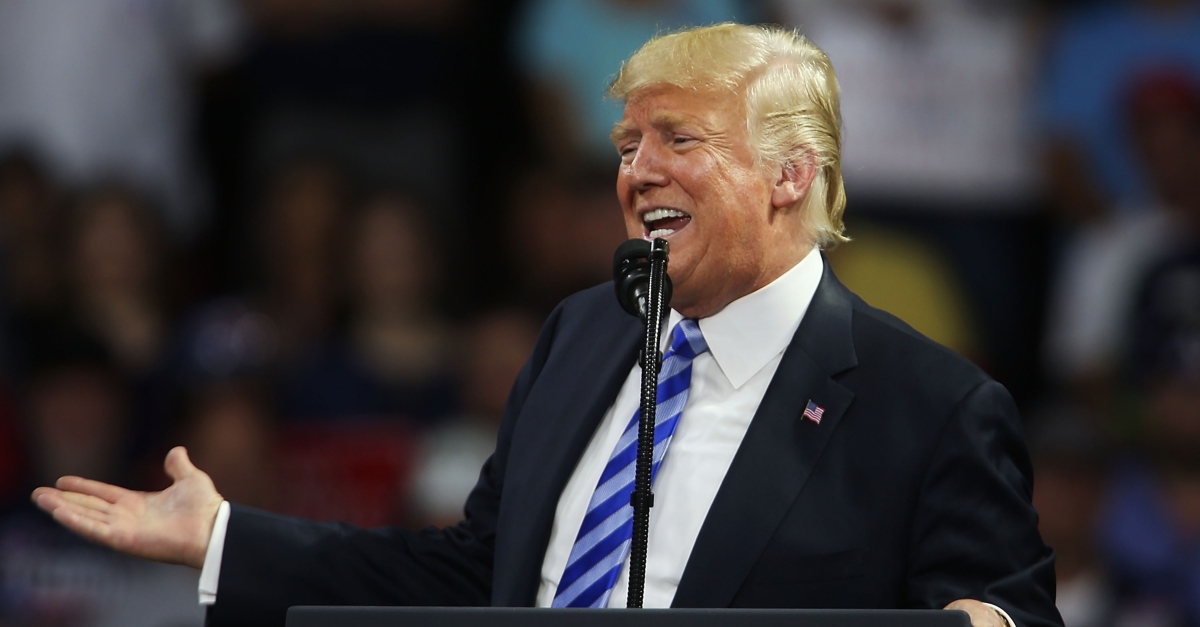
On a day when a federal appellate court in Washington, D.C. ruled that the House of Representatives’ subpoena for President Donald Trump’s tax returns was “valid and enforceable,” Trump lawyers filed a lengthy appellate brief in the United States Court of Appeals for the Second Circuit, belittling Manhattan District Attorney Cy Vance as a “county prosecutor” in the opening lines of the filing.
The appellate brief was filed because U.S. District Judge Victor Marrero denied the president’s request to prevent Vance from enforcing subpoenas demanding eight years’ worth of Trump’s tax returns — potentially opening the door to state criminal prosecution.
Here’s the first line of Trump attorneys’ statement of their case on appeal:
For the first time in our nation’s history, a county prosecutor has subjected the President of the United States to criminal process.
Judge Marrero, in case you missed it on Monday, rejected the “extraordinary claim” that Trump is completely immune from the criminal process.
“The President asserts an extraordinary claim in the dispute now before this Court,” Marrero wrote. “He contends that, in his view of the President’s duties and functions and the allocation of governmental powers between the executive and the judicial branches under the united States Constitution, the person who serves as President, while in office enjoys absolute immunity from criminal process of any kind.”
Marrero wrote that the reach of such an argument would undoubtedly place any sitting president above the law.
“As the Court reads it, presidential immunity would stretch to cover every phase of the criminal proceedings, including investigations, grand jury proceedings and subpoenas, indictment, prosecution, arrest, trial, conviction, and incarceration,” he said. “That constitutional protection presumably would encompass any conduct, at any time, in any forum, whether federal or state, and whether the President acted alone or in concert with other individuals.”
Trump attorneys on Friday noted that Vance wants to obtain the president’s financial records for the “express purpose of deciding whether to indict him for state crimes.”
The District Attorney appears to be investigating whether the President’s businesses accurately recorded two payments made in 2016 and, if not, who is responsible. JA48. Although the payments have been public knowledge since at least January 2018, the District Attorney waited until August 2019 to subpoena The Trump Organization. JA48. That subpoena requested “documents and communications” concerning the payments for “the period of June 1, 2015, through September 20, 2018.” JA39.
As Law&Crime noted before, Vance’s prosecutors interviewed incarcerated former Trump attorney Michael Cohen in August to determine whether the Trump Organization violated state laws (created false business records) with hush payments to Karen McDougal and Stormy Daniels. The prosecutors visited Cohen “soon after they subpoenaed the Trump Organization and American Media Inc., the publisher of the National Enquirer, and interviewed Michael Cohen about this,” CNN reported.
The investigation followed the Southern District of New York (SDNY) closing its hush money probe. Cohen was the only person do time as a result of federal probe of the hush payments. Cohen is currently serving out a three-year prison sentence in Otisville, New York after pleading guilty in the SDNY to campaign finance violations, tax evasion and bank fraud.
According to the New York Times, “several people with knowledge of the matter” confirmed the reported details on the subpoenas.
Vance’s office is reportedly looking into whether state laws were broken in the Trump/Trump Organization reimbursement of Cohen for facilitating the hush payments. Per the Times:
In particular, the state prosecutors are examining whether the company falsely accounted for the reimbursements as a legal expense. In New York, filing a false business record can be a crime.
But it becomes a felony only if prosecutors can prove that the false filing was made to commit or conceal another crime, such as tax violations or bank fraud. The tax returns and other documents sought from Mazars could shed light on whether any state laws were broken. Such subpoenas also routinely request related documents in connection with the returns
After the Judge Marrero ruling, Trump lawyers quickly moved to appeal and the Second Circuit issued a temporary stay.
Trump attorneys are now hoping the appellate court reverses the lower court’s ruling — and then some:
The district court’s decision is the first to relegate a sitting President’s federal claim to state court, and the first to hold that a State can criminally prosecute a sitting President. It should be reversed, and the subpoena should be stayed pending appeal and Supreme Court review.
We’ll see how that goes. The president’s lawyers maintained that Trump’s “claim of absolute immunity is meritorious,” claiming that “[t]here has been broad bipartisan agreement, for decades if not centuries, that a sitting President cannot be subjected to criminal process.”
Trump v. Vance by Law&Crime on Scribd
Jerry Lambe contributed to this report.
[Image via Spencer Platt/Getty Images]